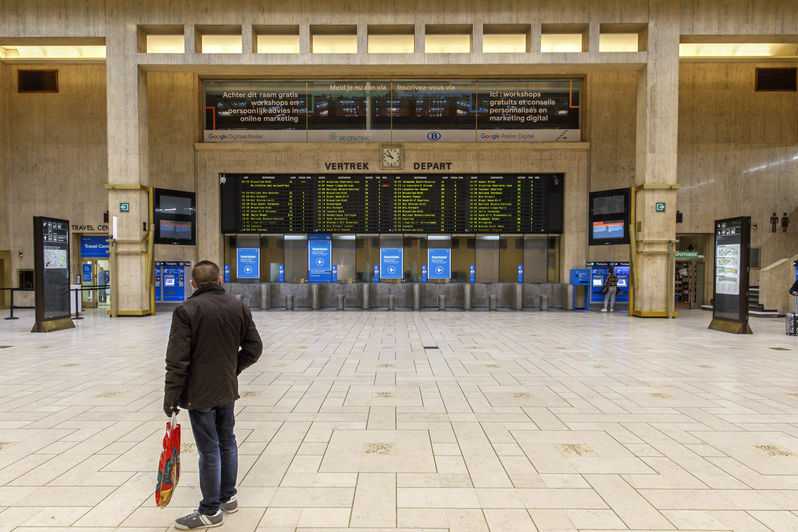EU to ban most overseas travelers for thirty days to curb virus
18 March, 2020

EU leaders agreed Tuesday to immediately impose travel and leisure restrictions of all foreigners entering European countries for at least thirty days to limit the pass on of the new coronavirus, and to set up fast-track transportation lanes to keep vital medical equipment, foodstuff and things flowing smoothly within the bloc.
As the virus case count in European countries climbed to over 60,000 and with an increase of than 2,700 persons dead, nervous national governments have introduced quick-fix actions such as for example partial border closures and quarantines with little consultation. The EU sought over three time of video foretells forge a united front against an illness that's also wreaking financial havoc.
“We reaffirmed the need to interact and do everything essential to deal with the crisis and its own implications,” European Council President Charles Michel told reporters. He said the 27 EU countries decided to impose border constraints on tourism and non-essential business “as fast as possible.”
The program exempts long-term EU residents, diplomats, some healthcare and transport workers.
European Commission President Ursula von der Leyen said her proposal for the restrictions “got a whole lot of support by the member states. It’s up to them right now to implement. They said they'll immediately do this.”
Chancellor Angela Merkel said the leaders agreed found in a conference call to an entry ban with “very, not a lot of exceptions,” and that Germany would begin implementing it immediately.
Merkel said citizens of Switzerland, Liechtenstein, the uk and Norway are actually exempt. The EU leaders likewise agreed to coordinate the repatriation of EU citizens stranded beyond your bloc, she said.
Von der Leyen said they also backed a good proposal to set up “green lanes” for trucks and various other priority vehicles aimed at beating the visitors jams that contain formed around crossing tips on internal borders, where zero ID or motor vehicle checks were required merely days ago.
Those transport rules, she said, “have to be implemented now”
The leaders decided to match again for a third video recording conference and to cancel a summit they planned to wait in Brussels late next week.
“We will be ready to do everything that's needed is. We shall certainly not hesitate to take further measures as the problem evolves,” von der Leyen informed reporters.
In a fresh update Tuesday, the European Centre for Disease Avoidance and Control said that 61,098 cases of the coronavirus have been reported in European countries and that 2,740 people have died, the overwhelming bulk in Italy.
After Italy, ground zero in Europe’s battle with COVID-19, Spain and today France have imposed lock-downs, confining citizens with their homes aside from urgent business like buying food or going to any hospital that might still have the capability to treat them.
Nine countries have informed the European Commission, the EU’s executive body, that they’ve reintroduced ID checks interior Europe’s passport-free Schengen Location. Among them happen to be Austria, Hungary, the Czech Republic and Poland, which all took unilateral action to halt the influx of migrants in 2015.
Indeed, this is a similar challenge that leaders will be grappling with as they confront the coronavirus - how to make sure that the fraying solidarity among partners in the same European club does not completely unravel mainly because the crisis deepens.
Asked Monday whether European countries can ever return to real ID-check free of charge travel following this, Merkel said: “I am hoping and so. But it’s been displayed that coordination didn’t work well everywhere the method you might have hoped.”
The EU proposals endorsed Tuesday are relatively modest, as Europe’s centralized powers in this crisis are limited. While it could be a Union, the world’s most important trading bloc remains an accumulation of 27 individual countries, some with populist and far-right governments that reject orders from Brussels.
“In recent days, European countries failed to coordinate their methodology,” Czech Primary Minister Andrej Babis stated Saturday as he announced the closure of retail businesses found in his nation. “We didn’t have to hang on for Brussels to give us any advice.”
In times of crisis, Europe’s machinery is painfully gradual. Like a super-butler working with an unpredictable 27-headed master, the EU’s significant bureaucracy offers strategies, proposes plans and once in a while cajoles but often it must await approval.
Source: the-japan-news.com
TAG(s):
